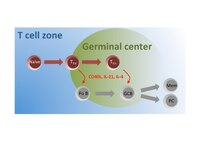
Photo from wikipedia
Background: Systemic lupus erythematosus (SLE) is a complex polygenic autoimmune disease characterized by immune-system aberrations. Among several types of immune cells, T follicular helper (Tfh) cells promote autoantibody production, whereas… Click to show full abstract
Background: Systemic lupus erythematosus (SLE) is a complex polygenic autoimmune disease characterized by immune-system aberrations. Among several types of immune cells, T follicular helper (Tfh) cells promote autoantibody production, whereas T follicular regulatory (Tfr) cells suppress Tfh-mediated antibody responses. (1) Objectives: To identify the characteristics of Tfr cells and to elucidate the mechanisms of conversion of Tfh cells to Tfr cells, we probed the phenotype of T helper cells in patients with SLE and underlying epigenetic modifications by cytokine-induced signal transducer and activators of transcription (STAT) family factors. Methods: Peripheral blood mononuclear cells from SLE patients (n=44) and healthy donors (HD; n=26) were analyzed by flow cytometry. Memory Tfh cells were sorted and cultured under stimulation with T cell receptor and various cytokines. Expression of characteristic markers and phosphorylation of STATs (p-STATs) were analyzed by flow cytometry and quantitation PCR. Histone modifications were evaluated by chromatin immunoprecipitation. Results: The proportion of CXCR5+FoxP3+ Tfr cells in CD4+ T cells tended to increase (2.1% vs 1.7%, p=0.17); however, that of CD4+CD45RA-FoxP3hi activated Tfr cells in Tfr cells was decreased (4.8% vs 7.1%, p Conclusion: Our findings indicated that the regulatory function of Tfr cells is impaired due to the low ability of IL-2 production and that IL-2 restores the function of Tfr cells through conversion of Tfh cells to Tfr cells in SLE. Thus, the reinstatement of the balance between Tfh and Tfr cells will provide important therapeutic approaches for SLE. References: [1]Deng J, Wei Y, Fonseca VR, et al. T follicular helper cells and T follicular regulatory cells in rheumatic diseases. Nat Rev Rheumatol. 2019; 15 (8): 475-90. Disclosure of Interests: : He Hao: None declared, Shingo Nakayamada Grant/research support from: Mitsubishi-Tanabe, Takeda, Novartis and MSD, Speakers bureau: Bristol-Myers, Sanofi, Abbvie, Eisai, Eli Lilly, Chugai, Asahi-kasei and Pfizer, Yamagata Kaoru: None declared, Naoaki Ohkubo: None declared, Shigeru Iwata: None declared, Yoshiya Tanaka Grant/research support from: Asahi-kasei, Astellas, Mitsubishi-Tanabe, Chugai, Takeda, Sanofi, Bristol-Myers, UCB, Daiichi-Sankyo, Eisai, Pfizer, and Ono, Consultant of: Abbvie, Astellas, Bristol-Myers Squibb, Eli Lilly, Pfizer, Speakers bureau: Daiichi-Sankyo, Astellas, Chugai, Eli Lilly, Pfizer, AbbVie, YL Biologics, Bristol-Myers, Takeda, Mitsubishi-Tanabe, Novartis, Eisai, Janssen, Sanofi, UCB, and Teijin
Journal Title: Annals of the Rheumatic Diseases
Year Published: 2020
Link to full text (if available)
Share on Social Media: Sign Up to like & get
recommendations!